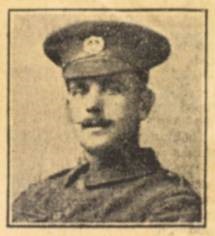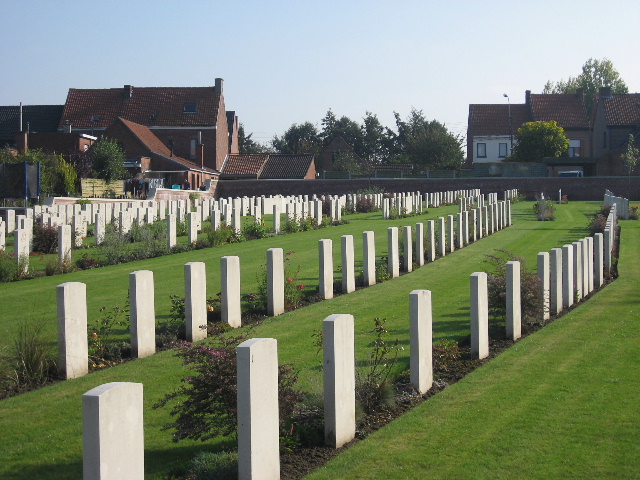Name
Frank Cannon
Conflict
First World War
Date of Death / Age
15/02/1916
32
Rank, Service Number & Service Details
Company Serjeant Major
14982
Essex Regiment
11th Bn.
Awards: Service Medals/Honour Awards
1914 /15 Star, British War and Victory medals
Cemetery/Memorial: Name/Reference/Country
POTIJZE BURIAL GROUND CEMETERY
H. 10.
Belgium
Headstone Inscription
Always Remembered by Those at Home
UK & Other Memorials
Pirton Village War Memorial,
St Mary’s Shrine, Pirton,
Methodist Chapel Plaque, Pirton,
Hitchin Town Memorial,
St Mary's Church Roll of Honour (Book), Hitchin
Biography
As with a number of the men on the Pirton War Memorial, Frank’s connection to Pirton is not immediately obvious. In fact, it was not until his connection to West Mill was discovered that Frank’s listing on the Village War Memorial was explained - West Mill lies near Ickleford and adjacent to Oughtonhead Common and the River Oughton and lay within the Pirton parish boundary.
Frank was born on November 8th 1885 in Hitchin and it is the Hitchin records that provide most of the following information.
His parents were John and Martha Cannon, who were born in Hitchin and Therfield respectively. The 1891 and 1901 censuses identify nine children; three girls and six boys, all born in Hitchin. They are named below(*1). The 1911 census does not add any more names, but gives the total number of children as thirteen and sadly records that five had died.
In 1891 and 1901 the family was living at 14 Church Yard, Hitchin. John (senior) was listed as a grocer in 1891 and then later as gardener and fruiterer. By 1911 most of the family, including Frank, had grown up and left home. The remaining family had moved to 16 High Street, Hitchin; John (senior) now recorded as a fruiterer and nurseryman, with his wife, John (junior), Annie and Ralph all listed as assisting in the business.
It is not clear when Frank left home, but after leaving school he worked in one of Hitchin’s firms of solicitors as a clerk, in fact for Mr Francis Shillitoe the coroner. He was a keen swimmer and diver and also played football for Hitchin Town. He was described as a “dashing player and good dribbler with a fine shot” and he had a County Cap – meaning he was selected to play at least five times. Queens Park Rangers spotted him and he signed for them in April 1907, although he continued his ‘day job’. He played for them against Manchester United in the 1907/08 Charity Shield. The match was played between the Football League champions (Manchester United) and the Southern League champions (QPR), the score was one all, so it was replayed and Frank also played in that game which Manchester United won four nil.
In April 1908, playing centre forward, he scored three goals against West Ham; that must have impressed them because by 1909 he had been persuaded to transfer to them, where oddly he was known as ‘Fred’. It was about this time that he married a young woman called Violet Maud, who was born in Potters Bar, and they moved into 87 Walsworth Road. He debuted for West Ham against New Brompton on January 1st 1910 and in his next game, against Norwich, he scored. That was to be his only goal and after only four appearances, all in January, he left the club. Their daughter Margaret Grace was born later in 1910 and he must have continued playing, because in the 1911 census, when he was boarding with his wife and daughter in the home of George and Annie Eve, 107 Gillingham Road, Gillingham, Kent, his occupation was given as ‘Nurseryman’s son working on nursery and professional footballer’. In fact he went on to play for Gillingham, then Colebridge - located in the Potteries - and for finally for Halifax in Yorkshire.
After his return to Hertfordshire, his name appears in connection with the war, in the Parish Magazines of September and October 1914 and by then he and Violet had three children. So it was some time after 1911 that he returned to Hertfordshire, moving to West Mill and taking on a smallholding. Both magazines record him as serving in the Bedfordshire Regiment and the Hertfordshire Express of November 14th 1914 lists him as one of the men of a local rifle club who had enlisted. All the men from the rifle club seem to be from Pirton and by that time Frank had been transferred to the 11th Service Battalion, Essex Regiment and held the rank of serjeant. We know from his Commonwealth War Graves Commission records that he later became Company Serjeant Major.
The 11th Essex was a service battalion – a battalion created specifically for the duration of the war. It was formed at Warley in September 1914 as part of K3 – Kitchener’s third army, and was attached to 71st Brigade in the 24th Division. The following January (1915) they were moved to Shoreham and then to billets in Brighton. In March they returned to Shoreham and then in June moved again, this time to Blackdown Barracks, Deepcut, Camberley, Surrey. They were ordered to the Front in August and landed in Boulogne on August 30th 1915. Unfortunately the Battalion’s war diary, obtained from the National Archives, starts on January 1st 1916 so Frank’s experience before that date is uncertain. However, in January the 11th Essex were in the Line at Potijze in Belgium, so it is likely that they went straight there and fought in the defence of Ypres (Ieper). Ypres is pronounced ‘Eepra’, but was known as ‘wipers’ to the British Soldier.
Frank was killed in action on Tuesday February 15th 1916 and the war diary records the preceding days. The 11th Essex had been in the trenches around Potijze, with rest periods away from the trenches spent in Ypres. Whether this could be described as rest is arguable as although they were behind the front line the town was constantly shelled and while ‘resting’ they still had to form working and carrying parties.
Frank returned to the trenches for the last time on the 11th. The bombardment was heavy and there were seven casualties that day. The shelling continued on the 12th and they observed an aircraft flying low over the enemy trenches before a gas alarm was called and a heavy cloud drifted towards them. It seems that it was smoke and not gas, but not knowing that and fearing that it was hiding an enemy attack they had no choice but to bravely stand their ground and pour rapid fire into the smoke. There were six casualties that day, but the next day was quieter with only three. The 14th was more eventful, more shelling, two mines*2 were blown somewhere to their right and the trenches were subject to enfilading – fire from the flank, along the line of the trench - very dangerous. Casualties included three officers and eight other ranks. On the 15th the enfilading continued, their front line was hit by shrapnel shells and they suffered thirteen casualties. It was the shrapnel that wounded Frank. The diary makes a simple statement ‘D Company had Serjeant Major Cannon wounded’ - it was fatal.
He did not die in one of the recognised Battles of Ypres, of which there were three, but rather in the general and bloody defence of the salient*3 to the east of Ypres. This prevented the Germans from taking Ypres and moving west to capture the British supply ports. By the end of the war 1,700,000 men from both sides had been wounded or killed in this area of Belgium.
Various local newspaper reports record his death and confirm his connection to Pirton. One records two families in bereavement, and notes that one was from the war ‘the sudden death at the Front of Sergt (actually Company Serjeant Major) Frank Cannon whose family had been residing in West Mill for some time.’
The reports that appeared in the North Herts Mail add detail from a letter written by Quarter Master Serjeant, L P Martin. The 13th Essex had been in the trenches for sixteen days and were just about to be relieved, ‘He was just ready to leave the trench when several shrapnel shells burst over him, wounding him and several others. Although his wound was rather serious – he was wounded in the back – it was quite thought he would get to England and recover, but I am sorry to say he died on his way to the dressing station about an hour after he was hit.’ It also confirms that Frank’s brothers, Harry (actually Charles Harry), Robert and Ralph were all serving, and that Ralph was serving in the same Battalion as Frank. His brothers do not have a known connection to Pirton, at least not before the war, although after the war Robert moved to West Mill and worked as a dairyman.
The 13th Platoon Commander, H Aylmer Burdett also wrote to Frank’s wife expressing how sorry he was for her loss.
The Parish Magazine of May 1918 lists some of the subscribers for the War Memorial Shrine and it includes a donation of ten shillings, a substantial sum, from Mrs Cannon of the High Street, presumably his widow.
Frank Cannon is buried in Potijze Burial Ground Cemetery, Ypres, West-Vlaanderen, Belgium. The cemetery lies to the north-east of the town and holds 584 Commonwealth burials from the First World War, of which 565 are named graves. It is a large space considering the number of burials and with low walls has an unusually open and exposed feel. Now it is surrounded by private housing, but at the time was an area which suffered constant shell fire. It was close to Potijze Chateau, which contained an advanced dressing station and this may be where Frank spent his last hours. His family chose an inscription for his headstone ‘Always Remembered by Those at Home’.
Frank is also remembered on the Hitchin Town War Memorial.
(*1) John Herbert (b c1883), Charles H (probably Harry, b c1884), Frank (b 1885), Alice (b c1887), Robert (b c1888), Annie (b c1882), Ralph (b c1884), Ida (b c1889) and Cecil V (b 1890).
(*2) Armies mined under their enemy’s lines, packed them with explosives and blew them up to dramatic affect causing a massive death toll.
(*3) A salient is an area protruding forward from the rest of the line and therefore liable to attack on three sides.
Additional Information
Text from the book: The Pride of Pirton
Acknowledgments
The Pride of Pirton book – www.pirton.org.uk/prideofpirton Chris Ryan / Tony French / Jonty Wild



